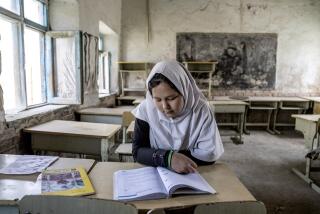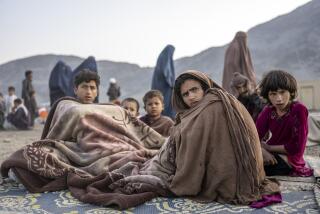Pakistan to Expel Foreign Students at Islamic Schools
- Share via
ISLAMABAD, Pakistan — All foreign students studying at Islamic schools in Pakistan will be ordered to leave the country, President Pervez Musharraf said Friday.
About 1,400 foreign students are enrolled in madrasas, or Islamic seminaries, some of which have been linked to militant groups.
The foreign students “have to be removed from the country,” Musharraf said at a news conference. “Even those having dual nationality. No one in the madrasas will be allowed to spread extremism and hatred in the society.”
Pakistani officials confirmed this month that three of the four suicide bombers who attacked London’s transit system July 7 had visited Pakistan last year and early this year. Musharraf confirmed Friday that one of the men had stayed at a Pakistani madrasa. He did not name the school or the bomber.
After the London bombings, Musharraf launched the third crackdown on extremists in as many years. Though the previous crackdowns have rounded up some foreign militants directly linked to Al Qaeda, the infrastructure of domestic militant groups has remained largely intact.
In the new crackdown, hundreds of people have been detained, including some accused of publishing extremist materials and preaching hatred in mosques. The Pakistani president said that some of the detainees had been picked up in connection with the London attacks but that no direct link had been found.
Musharraf reiterated that his government was now requiring madrasas to register with authorities by Dec. 31 and provide more mainstream education.
The government estimates that 1.7 million students attend as many as 30,000 of the schools, most of which emphasize memorization of the Koran and other lessons in Islam.
“No mosque or madrasa will be allowed to fan extremism,” Musharraf said. He gave no details about the penalties for failing to register or about how registration might help.
Hard-line Muslim clerics, religious parties and madrasas have vowed to resist regulations.
Musharraf stressed Friday that he was serious about the current crackdown, telling reporters that he was personally supervising the operation.
“I have directed the police and law enforcement agencies not to arrest ‘nobodys,’ but only the leaders of banned militant organizations,” he said. “The operation will continue.”
Afghanistan’s government says numerous Taliban officials continue to live and organize in Pakistan, an assertion Musharraf’s government denies.
Leaders of some of the most notorious militant groups have been central to Pakistan’s support for the fight against India’s rule of part of Kashmir. And despite peace efforts between India and Pakistan, Indian officials say infiltrations are again increasing across the cease-fire line that divides the territory between the two nations.
Such militants have close ties to the Pakistani military’s Inter-Services Intelligence agency and are considered heroes by many Pakistanis. It would therefore be difficult for Musharraf to prosecute them without at least achieving a peace agreement with India first.
Musharraf said the government’s crackdown had widespread backing among the nation’s moderate majority, which has rejected opposition parties’ call for a strike to protest the operation.
Musharraf said that as a result of his government’s efforts, Osama bin Laden’s Al Qaeda network, which has ties to some Pakistani militant groups, “cannot organize attacks elsewhere in the world from Pakistan.”
More to Read
Sign up for Essential California
The most important California stories and recommendations in your inbox every morning.
You may occasionally receive promotional content from the Los Angeles Times.













